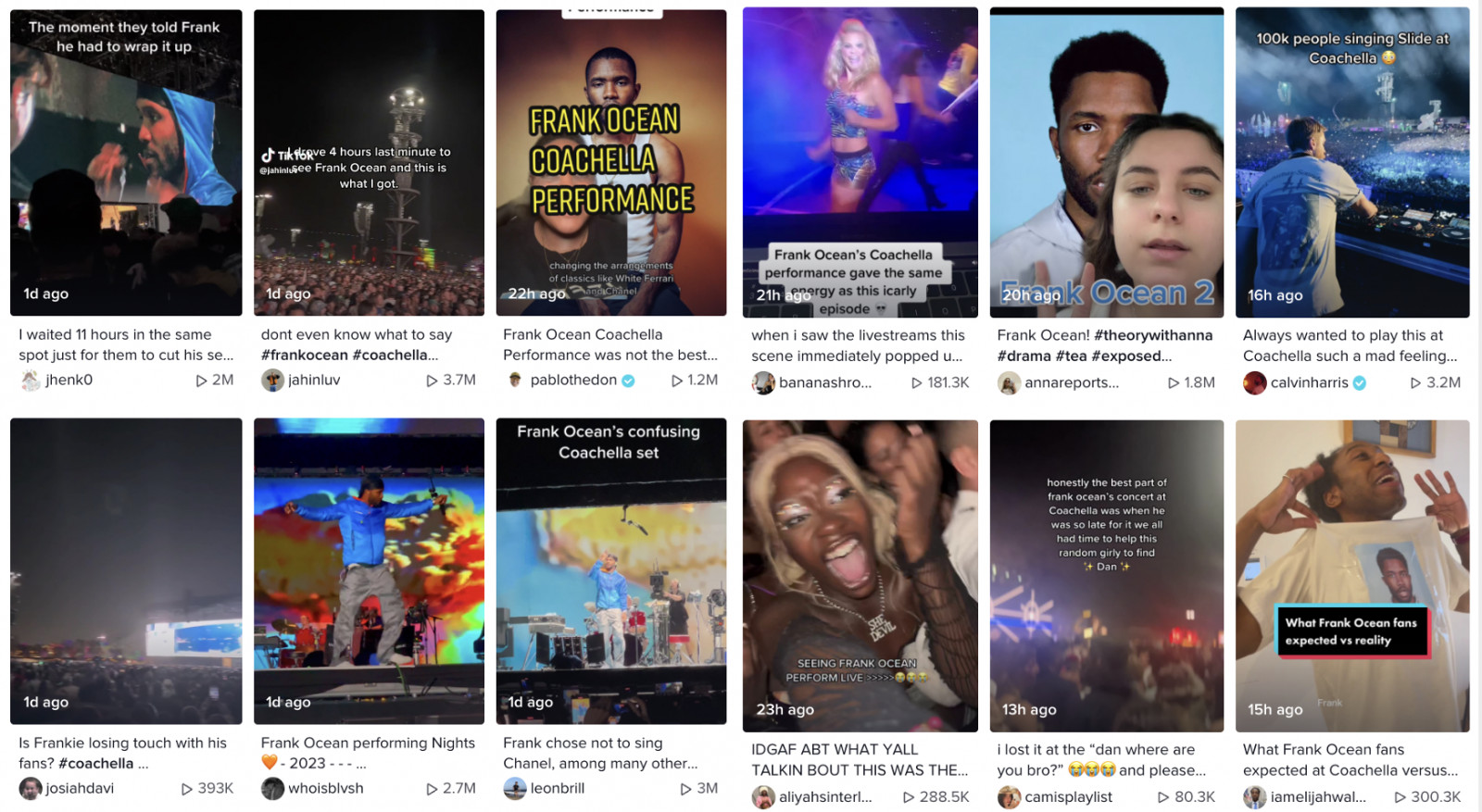Live streams won’t steal ticket sales, but social just might

Photo: Photo courtesy of TikTok

Frank Ocean’s headlining Coachella set on Sunday night was one of the most-anticipated sets ever, not least because the elusive singer has not performed publicly since 2017, but also because the performance was a holdover from 2020’s cancelled festival. So when Coachella's official live streaming partner, YouTube, abruptly announced that it would not stream Ocean’s set, fans were understandably upset.
It is yet unclear why Ocean was removed from the stream — although given the artist’s reputation for limiting access, it is not a complete surprise. This is the same artist who reportedly stocked Coachella’s vinyl tent with only a single copy of Blonde. But if the idea was to amplify exclusivity, it did not go as planned, as TikTok users immediately stepped in to fill the gap.
Exclusivity in a world of ubiquity
Digital experiences are now ubiquitous, raising the value of live, in-person experiences. Ignoring the haphazard way in which it was announced, the decision to not live stream Coachella’s most-anticipated set could be seen as smart. Had it been clear ahead of time that the set would not be streamed, it would be a true “had-to-be-there” moment.
Well, this might have worked five years ago. But with the rise of short-form video, it is becoming increasingly difficult to create true “had-to-be-there” moments. Unless event organisers ban phones at the venue — and some have — fans will provide, in effect, hundreds of live streams for free. Just search “Taylor Swift Eras tour” on TikTok.
This raises an interesting question for live streaming. When live streaming rose during the pandemic, many questioned whether streams would cannibalise ticket sales. It is now clear that any negligible loss is worth the huge gain of expanding concerts’ addressable audience to those who never would (or could) have purchased tickets anyway. Live streams do not cannibalise ticket sales — but will social media cannibalise live streams?
Featured Report
MIDiA Research 2026 predictions Change is the constant
Welcome to the 11th edition of MIDiA’s annual predictions report. The world has changed a lot since our inaugural 2016 edition. The core predictions in that report (video will eat the world, messaging apps will accelerate) are now foundational layers of today’s digital economy.
Find out more…YouTube’s loss is TikTok’s gain
Like many Ocean stans who stayed up late to watch his performance from home, as soon as I saw YouTube’s announcement, I immediately rushed to TikTok. A search for “Frank Ocean Coachella” turned up thousands of videos with footage from the event. I could watch every major moment from every angle — Ocean talking about the possibility of a new album; performing ‘Nights’ — as well as the moments you would not get from an official live stream, like live reactions, interviews with fans on the ground, and footage of frustrated attendees leaving when Ocean was an hour late.
Watching Ocean’s set on YouTube would have provided a higher-quality version. But TikTok gave me something that an official live stream does not — a way to experience the event’s cultural impact. This feels similar to the way many people go to publications like The New York Times for a trusted breakdown of the news, and then to Twitter to understand how people actually feel about it. And the decision to cut Ocean’s stream was ultimately moot, since it did little to restrict my access.
Working with social media, not against it
Once, the only way to experience a concert was to attend it. Now, consumers arguably have three ways to experience concerts:
The in-person version
The official live stream version
The unofficial social media version
Coachella’s partnership with YouTube did extend to YouTube Shorts, where fans could view exclusive content from artists as well as a list of creators with whom YouTube partnered to provide on-the-ground coverage. Perhaps this is the future of festival and concert live streams: partnering with users themselves as quasi-correspondents.
User-generated content (UGC) can also sidestep rights clearance issues that official streams cannot. It is totally possible that YouTube’s official stream was pulled because it could not clear all the necessary rights in time. On the other hand, since TikTok is simply a platform for users’ uploads, it can let users live stream concerts and (if pushed) take those videos down later. In this way, TikTok resembles where YouTube was a decade ago, while YouTube is now more like MTV.
Of course, this is not to advocate for more phones at shows. But this behaviour is already ingrained, and at a festival like Coachella, it would be impossible to prevent it. As short-form video continues to grow, we may need to prepare for a world in which every concert attendee is a live streamer.

The discussion around this post has not yet got started, be the first to add an opinion.